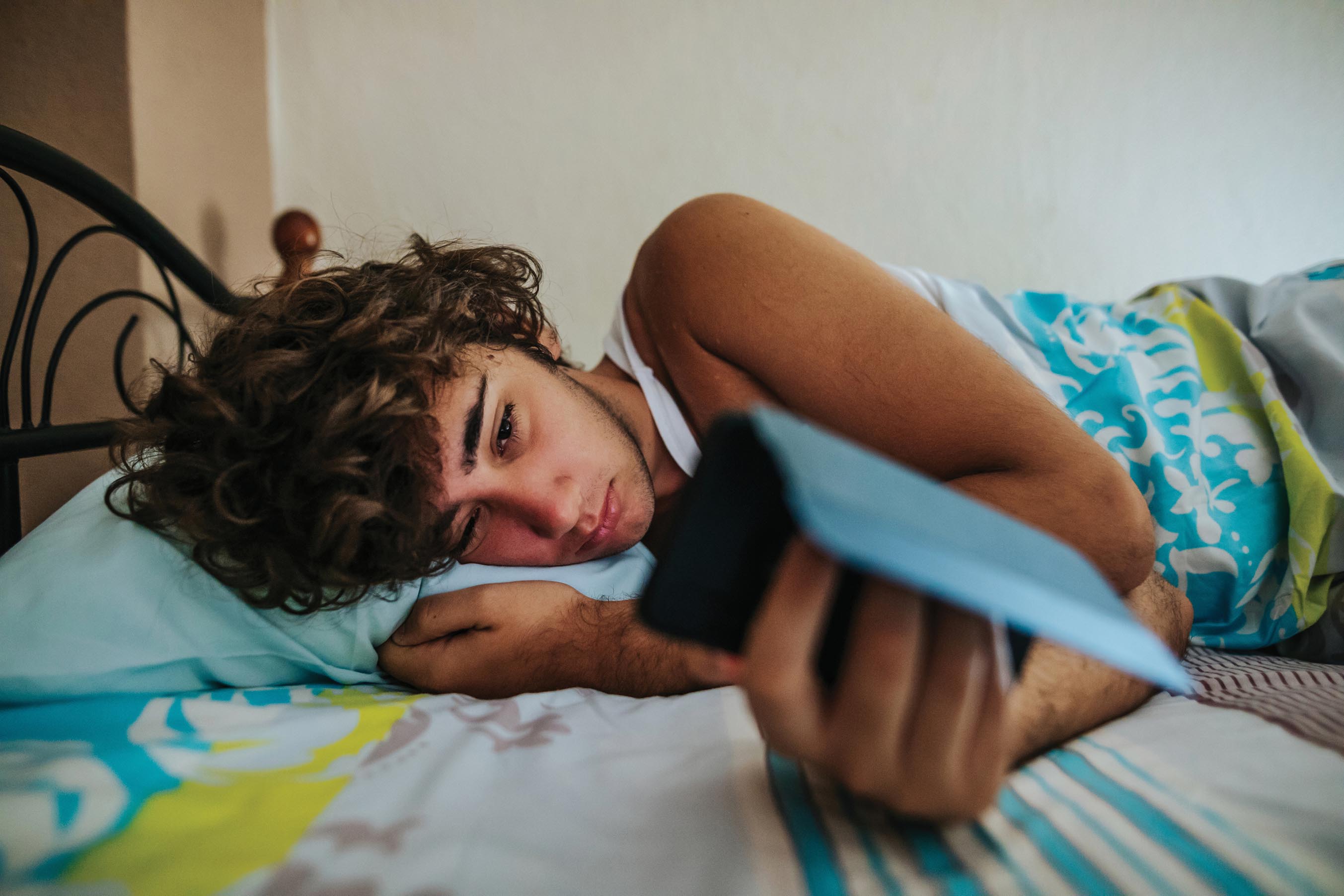LEARNING GOAL
Summarize the three reasons people need to sleep.
LEARNING GOAL
Summarize the three reasons people need to sleep.
Traits that are adaptive for a species help the species survive and reproduce in a changing environment. At first glance, sleep hardly seems adaptive. Tuning out the external world for periods of time can be a threat to survival if a predator pounces on you or you drive your car into a tree. But we cannot avoid sleep. Eventually our bodies shut down, and we sleep whether we want to or not.
But why do we sleep? Most animals sleep, even if they have peculiar sleeping styles. For instance, in some dolphin species the left and right cerebral hemispheres take turns sleeping. Thus sleep must serve an important biological purpose. In other words, it must help us adapt and respond in our environment. Researchers have proposed three reasons that sleeping is adaptive and beneficial: restoration of the body, preservation from harm, and support for memory and learning.
Three Benefits of Sleep Sometimes we sleep longer than usual. Why? Think about the last time you engaged in demanding physical activity—maybe you spent the day helping a friend move or you ran a long race. Most likely you needed extra sleep afterward. According to the restorative theory, sleep lets the body, including the brain, rest and repair itself. Growth hormone, released from the endocrine system during deep sleep, helps repair damaged tissue. Sleep apparently lets the brain replenish its energy stores and also strengthens the immune system (Hobson, 1999; Irwin, 2019). Consider that after a traumatic brain injury (TBI), people need more sleep. One study found that people who had experienced any type of TBI slept about an hour longer per night, and this increased sleepiness lasted at least 18 months (Imbach et al., 2016).

FIGURE 3.17 Sleeping Predator
After a fresh kill, a lion may sleep for days.
According to the circadian rhythm theory, sleep has evolved to preserve animals, including humans, from harm. Sleep keeps creatures quiet and inactive when the danger of attack is greatest—usually when it is dark. Each day, animals need only a limited amount of time to accomplish the necessities of survival, such as getting food. As a result, it is adaptive for animals to spend the rest of the time inactive, preferably hidden. So an animal’s typical amount of sleep depends on how much time that animal needs to obtain food, how easily it can hide, and how vulnerable it is to attack. Large grazing animals that are vulnerable to attack, such as cows and deer, sleep little. Large predatory animals, which are generally not vulnerable, sleep a lot (Figure 3.17). We humans depend greatly on vision for survival. We are adapted to sleeping at night because our early ancestors were more at risk in the dark.
Scientists have also proposed that sleep is important because it is involved in strengthening neural connections that serve as the basis of learning (Paller et al., 2021). The general idea of this consolidation theory is that circuits wired together during the waking period are consolidated, or strengthened, during sleep (Wilson & McNaughton, 1994). Recent research demonstrates that sleep spindles play an important role in memory consolidation during sleep (Antony et al., 2019; Cowan et al., 2020). As people age and sleep more lightly, their EEGs show fewer sleep spindles, which predicts memory problems common in older adults (Mander et al., 2017).
When research participants in one study slept after learning word lists, their recall was better than in control conditions in which participants remained awake after learning the lists (Drosopoulos et al., 2007). People may be especially likely to perform better if they dream about the task while sleeping. In one study, participants learned how to run a complex maze. Those who then slept overnight performed better on the maze than participants who had not slept. Those who dreamed about the maze performed the best of all (Wamsley & Stickgold, 2019).
If your main style of studying is the all-nighter, then findings that link sleep to learning should make you think twice. Evidence is clear that sleep deprivation, even for one night, leads to memory loss (Ashton et al., 2020). In one study, students who were sleep deprived for one night showed reduced activity the next day in brain areas essential for memory (Yoo et al., 2007). These sleep-deprived students also showed poorer memory at subsequent testing. Sleep also seems to prepare the brain for its memory needs for the next day (Oudiette & Paller, 2013). The best advice for preparing for exams is to study, sleep, and then study again. To do well on exams, get your sleep (Mazza et al., 2016).
Sleep Deprivation Causes Numerous Problems We have all gone through periods when we did not get enough sleep. Does the occasional lack of sleep harm us? Many laboratory studies have examined the effects of temporary sleep deprivation on physical and mental abilities. Surprisingly, most studies find that two or three days of sleep deprivation have little effect on strength, athletic ability, or the performance of complex tasks.

FIGURE 3.18 Sleep Deprivation
Students may try to avoid sleep. But sleep will catch up with them!
If you find yourself nodding off over your textbook after a night without sleep, however, you’re not alone (Figure 3.18). When deprived of sleep, people find it difficult to perform quiet tasks, such as reading, and nearly impossible to perform boring or mundane tasks. A long period of sleep deprivation decreases mental abilities. People who suffer from chronic sleep deprivation may experience attention lapses and reduced short-term memory.
Sleep deprivation also causes physical problems. Studies with rats have found that extended sleep deprivation compromises the immune system and leads to death. Sleep deprivation is also dangerous and potentially disastrous because it makes people prone to microsleeps, in which they fall asleep during the day for a few seconds or even a minute (Coren, 1996). Sleep deprivation impairs motor abilities, contributing to accidents and injuries, and it interferes with the body’s hunger signals, contributing to overeating and weight gain (late-night pizza run, anyone?). And—to add insult to injury—others perceive us as less attractive when we are sleep deprived compared with when we are well rested (Axelsson et al., 2010).
Sleep deprivation is strongly associated with negative mental health. A lack of sleep, whether from insomnia or simply not getting enough sleep, predicts feelings of depression (A. B. Williams et al., 2019) and anxiety (Nyer et al., 2013). Even a short period of sleep deprivation impairs mood, and this effect is stronger in younger adults than in older adults (Schwarz et al., 2019). In recent years, college students have reported more feelings of depression and anxiety, and it is possible that a lack of sleep contributes to those problems (Prichard, 2019).

FIGURE 3.19 Electronic Devices in Bed
Using a smartphone while in bed is associated with less time sleeping and poorer sleep quality. Turn off notifications or use airport mode so that your sleep is not disturbed.
One factor that is increasingly causing sleep problems is the proliferation of mobile devices, such as smartphones (Mac Cárthaig et al., 2020). Since the widespread adoption of such devices, more children now report getting insufficient sleep (Twenge et al., 2017). Using social media and interacting with others produces more sleep problems than using the device to watch television or play games (Hisler et al., 2020). Part of the problem is that many adolescents and young adults do not mute or turn off their phones at night, with the result that texts and other notifications interrupt their sleep (Figure 3.19). A study of first-semester college students found that those who used their devices at nighttime had poorer sleep quality (Whipps et al., 2018). What is not clear is whether using the device interferes with sleep or whether students who are having trouble sleeping pass the time by using their devices. Some people are now so used to sleeping with their devices that they even text while in deep sleep states, although the texts are usually gibberish or nonsensical. In one study, about one in four college students reported sleep texting, and these students also reported the lowest quality of sleep (Dowdell & Clayton, 2018).
When you finally do sleep after a long period of deprivation, you will enter the REM stage more quickly and will have more REM dreams than usual. This REM rebound after deprivation implies that REM sleep is a particularly important part of the sleep process (Suchecki et al., 2012).
LEARNING GOAL CHECK: REVIEW & APPLY